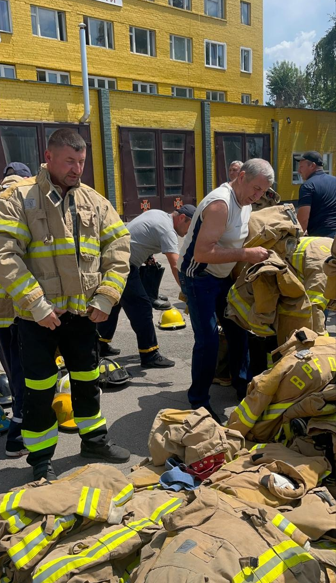On Ukraine Trip, Brooklyn Park Firefighters Offer Assistance
Many travelers leave home with a brooding, anxious sense of uneasiness — even more so if that trip brings them to an overseas warzone with ever mounting casualties.
But Brooklyn Park Fire Chief Shawn Conway seemed unfazed as he spoke about a recent trip he took to Ukraine.
“This is a country that experiences threats on a regular basis,” he said. “That is a country at war. Two days ago there was a bombing in Kyiv.”
A contact in Ukraine asked if he and his travel companions were comfortable making the trip while the country was at war.
“Without hesitation we said ‘yes,'” he said. “We know that we have something that we can provide that would be helpful for you.”
His fellow travelers included retired Brooklyn Park Firefighter Mark Lynde — the owner of Lynde’s Restaurant and Catering — and Lee Scheumann of the nonprofit Hand in Hand Logistics.
Due to the many no-fly zones in Ukraine, it was a lengthy trip to the war-torn country. An 11-hour plane ride was followed by a 19-hour train ride and a four-hour car ride to get to their destination.
“It was a logistical nightmare on the planes and the trains,” Lynde said. “I haven’t been on a train, and 19 hours? That’s a long time to be on a train.”
When they arrived, they found a civilian firefighting force in serious need of help.
According to Conway, many firefighters in the country don’t have any personal protective equipment.
“No disrespect, but they probably are about 50 years behind us,” Lynde said. “Going into a small town, they don’t know what CPR is, never seen a defibrillator.”
By contrast, the Brooklyn Park Fire Department, as well as a couple of nearby departments, had spare equipment that needed a home.
“Gear that is used here in the United States very little but has an expiration date on it, we can’t use it after 10 years,” Lynde said.
On their trip, they brought about 50 sets of firefighter protection gear.

Ukrainian firefighters try on jackets donated by the Brooklyn Park Fire Department.
But they offered more than just protective jackets and boots.
“It’s how can we support the training and understanding of how to use that equipment, and what does that look like,” Conway said.
They trained Ukrainians on medical response and vehicle extractions — important skills when bombs are never far away.
According to Conway, a phone app would alert Ukrainians if there was a threat of a bomb or missile strike. Those warnings often came five times a day.
And while the crew came back lighter on gear, they brought back the knowledge that they may have saved lives.
“It’s a sense of pride that we’re able to pay it forward,” Conway said.


